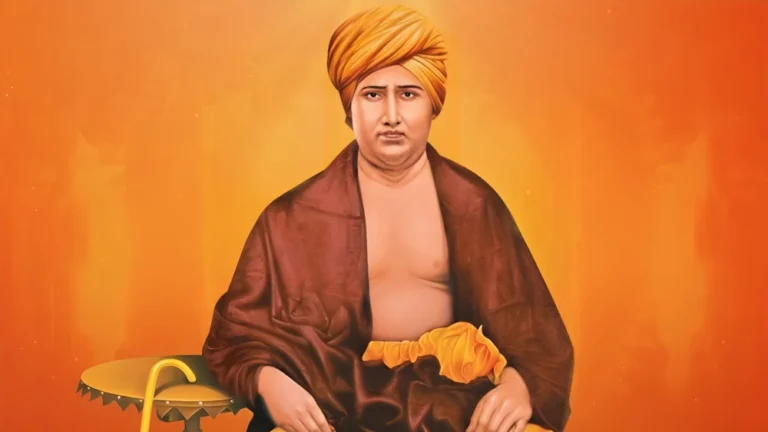Maharishi Dayanand Saraswati Jayanti 2024: born on February 12th, 1824 in Tankara, Gujarat, belonged to a Brahmin family. His parents, Lalji Tiwari and Yashodhabai, were orthodox Brahmins.

The birth anniversary of Swami Dayanand Saraswati, the founder of Arya Samaj, is celebrated as Maharishi Dayanand Sarasati Jayanti. He was a renowned Indian philosopher and social leader who initiated the call for Swaraj with the famous slogan “India for Indian” in 1876.
Maharishi Dayanand Saraswati Jayanti Date
This year the festival will be observed on 5 March 2024 which falls on a tuesday.
Celebrated on the tenth day of Krishna Pasha in the month of Falgun, Maharishi Dayanand Saraswati Jayanti marks the birth anniversary of Swami Dayanand Saraswati, the visionary founder of Arya Samaj. He was a pioneer in advocating against social injustices like animal sacrifice, caste system, child marriage, and discrimination against women. Swami Dayanand’s teachings, including his condemnation of idol worship and pilgrimages, are immortalized in his renowned work “Satyarth Prakash” (The Light of Truth), which played a significant role in India’s fight for independence.
The Significance and Background of Maharishi Dayanand Saraswati Jayanti.
Swami Dayanand, originally known as Mool Shankar Tiwari, was born into a Hindu family and grew up to become a distinguished scholar of Vedic knowledge. Convinced that Hinduism had strayed from its core principles, he dedicated his life to revitalizing Vedic ideologies. Dayanand embarked on a 25-year journey as a wandering ascetic to gain a profound understanding of life and its significance.
In 1875, he established the Arya Samaj with a singular goal in mind: fostering universal brotherhood. Dayanand advocated for the belief that “all actions should be carried out with the primary aim of benefiting humanity.” He penned down the 10 principles of the Arya Samaj, which are now embraced by millions worldwide.
Contribution to the community:
An Indian thinker, community leader, and the visionary behind the Arya Samaj movement.
Arya Samaj, a reformist initiative rooted in Vedic principles, was championed by him as he rallied for self-governance with the iconic call “India for Indians” back in 1876.
A self-educated luminary and a trailblazing figure in Indian history, he left an indelible mark on society, earning recognition from both the elite and the masses.
The inaugural Arya Samaj chapter was inaugurated by him in Mumbai (then Bombay) in 1875, paving the way for the establishment of the organization’s headquarters in Lahore.
His grand vision for India encompassed a society devoid of class distinctions and caste divisions, a nation united in all aspects, and free from foreign dominance, with the Aryan faith as the unifying religion.
Drawing inspiration from the Vedas, he hailed them as the bedrock of Indian civilization, unwavering and authentic, advocating a return to these ancient scriptures with the rallying cry “Back to the Vedas.”
Embracing the Vedic concept of the chaturvarna system, he rejected the notion of birth-based caste and instead emphasized one’s occupation as the defining factor in identifying as a brahmin, kshatriya, vaishya, or shudra.
Impact on the Education System:
He revolutionized the education system and is widely regarded as a pioneer of modern India.
The inception of DAV (Dayanand Anglo Vedic) schools in 1886 aimed to fulfill Swami Dayanand Saraswati’s vision.
The Lahore branch became the first DAV School, led by Mahatma Hansarj as the headmaster.
What is Arya Samaj?
The goal is to restore the Vedas, the earliest Hindu scriptures, as revealed truth. He dismissed all later additions to the Vedas as corrupt but, in his own interpretation, included much post-Vedic thought.
In the 1920s and early 1930s, tensions escalated over various issues. Muslims were upset by “music-before-mosque,” the cow protection movement, and the Arya Samaj’s efforts to reintegrate those who had recently converted to Islam back into the Hindu community (shuddhi).
The Arya Samaj has always had its largest following in western and northern India.
The Samaj is against the worship of murtis (images), animal sacrifice, shraddha (rituals for ancestors), caste based on birth rather than merit, untouchability, child marriage, pilgrimages, priestly occupations, and temple offerings.
It supports the infallibility of the Vedas, the concepts of karma (the consequences of past actions) and samsara (the cycle of death and rebirth), the sanctity of the cow, the significance of samskaras (individual sacraments), the effectiveness of Vedic offerings to the fire, and social programs.
The organization has promoted female education and intercaste marriage, established missions, orphanages, and homes for widows, created a network of schools and colleges, and engaged in famine relief and medical assistance.
FAQ about Maharishi Dayanand Saraswati Jayanti
Why do we celebrate Maharishi Dayanand Saraswati Jayanti?Maharishi Dayanand Saraswati Jayanti is observed in honor of a distinguished Hindu monk, a respected scholar, and a philanthropist whose impact on humanity continues to be acknowledged today.
What was Swami Dayanand Saraswati famous for?
Dayananda made several significant contributions, including his stance against untouchability, advocacy for gender equality, and his insightful interpretations of the Vedas in both Vedic Sanskrit and Hindi.
How did Dayanand Saraswati died?
Dayananda passed away following intense public scrutiny of a royal leader, in a manner that implies he could have been poisoned by one of the maharaja’s followers. However, the allegation was never substantiated in a legal setting.
What founded Dayanand Saraswati?
On April 7, 1875, he established the Arya Samaj. This reform movement emphasized the belief in One God and denounced idol worship. He also spoke out against the elevated status of priests in Hinduism and criticized the existence of numerous castes.